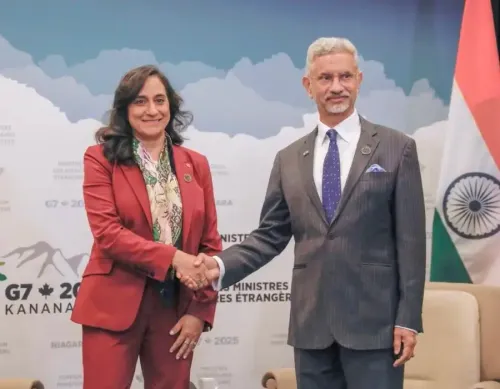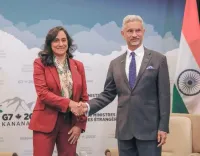Is Germany Ready to Support NATO's Military Expansion Despite Troop Shortages?

Synopsis
Key Takeaways
- Germany supports NATO's military expansion.
- 60,000 additional troops needed for increased defence requirements.
- Persistent troop shortages despite recruitment efforts.
- New constitutional amendment allows for increased defence spending.
- NATO spending targets aim for 3.5% of GDP by 2032.
Berlin, June 5 (NationPress) German Defence Minister Boris Pistorius announced on Thursday that Germany stands firmly behind NATO's ambitious military expansion strategy, which is anticipated to receive approval during the alliance's upcoming defence ministers' meeting in Brussels. Nonetheless, the nation is currently facing a pronounced shortage of troops.
In order to fulfill the heightened defence obligations outlined in the plan, the German Bundeswehr will require an increase of 60,000 active-duty soldiers, Pistorius conveyed to the press prior to the meeting. "Considering Germany's size and economic capability, we are prepared to take on a substantial share of NATO's military enhancement," he stated. "As the traditional second-largest military force within the alliance, we will persist in this role."
NATO Secretary-General Mark Rutte underscored on Wednesday that the alliance necessitates "greater resources, troops, and capabilities" to effectively execute collective defence strategies and address any potential threats. He pointed out air and missile defence, long-range weapons systems, logistics, and extensive land force formations as critical priorities.
However, Germany continues to contend with a chronic military personnel deficit. Despite intensified recruitment initiatives, the Bundeswehr experienced a further decrease in troop numbers last year, alongside an increase in the average age of soldiers. According to the defence ministry, the total military personnel count was approximately 181,000 at the end of 2024.
Previously, Pistorius had set a target to expand Germany's overall military strength to around 460,000, which includes 203,000 active-duty soldiers, 60,000 current reservists, and an additional 200,000 new reservists. He has also unveiled plans to "establish and fully equip new large military formations."
To facilitate this expansion, German President Frank-Walter Steinmeier enacted a constitutional amendment in March to ease the country's so-called "debt brake," enabling increased government borrowing for defence and infrastructure projects. This initiative aims to strengthen Germany's role in European security, as reported by Xinhua.
Regarding the reinstatement of mandatory military service, Pistorius acknowledged that Germany currently lacks adequate training and accommodation facilities. Consequently, the country will retain its voluntary military service system in the short term while incrementally enhancing capabilities.
At the end of this month, NATO member states are expected to finalize new defence spending goals during a summit in The Hague. NATO chief Rutte has proposed that members allocate 3.5% of their gross domestic product to direct defence expenditures, in addition to 1.5% for broader security-related spending by 2032.









